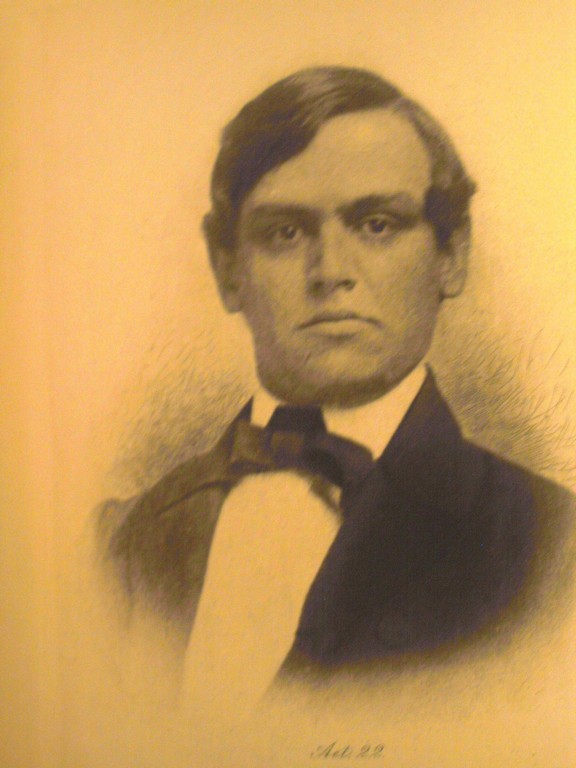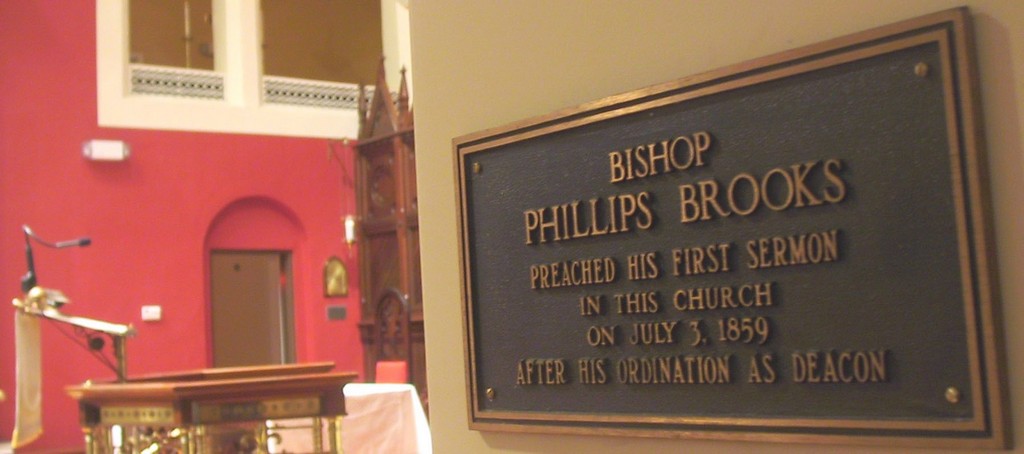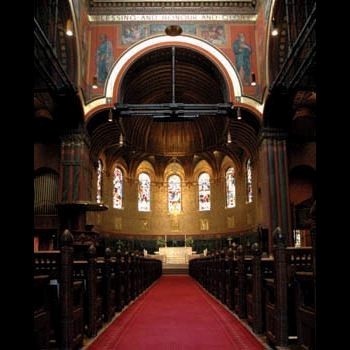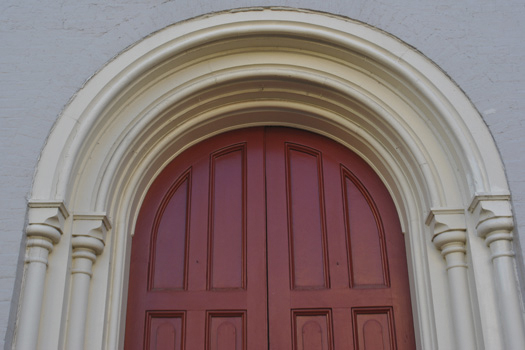

It is appropriate that when we re-hung the plaques after the renovation the Phillips Brooks plaque was moved from the back wall of the Church to the front next to the pulpit. From the time he preached at St. George’s in July, 1859 until his premature death in 1893 at age 57 Phillips Brooks never stopped preaching. He became the most famous Episcopal minister of his time at a time when the measure of a minister was his preaching through the sermon. His counsel to students and preachers alike was simple – “Don’t preach that people ought to go to church. But make religion so great and attractive that they cannot keep away.”
Brooks was encouraged to attend Virginia Theological Seminary (VTS) due to the influence of his family minister in Boston. While VTS matched his preference from “low church”, there were servants that that were slaves. He wrote “there is nothing of the brutality of slavery here, but the institution is degrading the country just as much.” Except for Dr. William Sparrow, he wasn’t impressed with the the other professors. Brooks was widely read and had a firm grasp of the classics.
He had begun to write sermons the last year of seminary and preaching to a small congregation. He wrote to his brother William he couldn’t “recall many pleasanter hours” than writing these early sermons. Brooks graduated from Virginia Theological Seminary on June 30, 1859 and ordained the next day. (The picture above was taken in 1857). He was invited to preach at St. George’s by his friend, then rector, A. M. Randolph. Randolph provided this account of his visit
“He was ordinated a deacon in the seminary chapel on Friday the last week in June, 1859, and the next day I had the pleasure of welcoming in my home in Fredericksburg, Va. On Sunday, he preached for the first time in the morning, and again at night at St. George’s Church. The good people of Fredericksburg refer with pride to the fact that his first sermons were preached there, and some of the older members of the congregation who innocently regarded St. George’s as the centre of church influence in Virginia, and if of Virginia, necessarily so of the world, might have supposed that their enthusiastic verdict of him, that he was the best young preacher they have ever heard, was the foundation of his success and his wide reputation throughout America and England”
Randolph wrote of the secrets of Brooks’ success ..”a singular absence of self-consciousness, a spontaneity of beautiful thinking, clothed in pure English words, a joy in his own thoughts, and a victorious mastery of the truth he was telling, combined with humility and reverence and love for the congregation… “
Brooks descended on his mother’s side from a long line of Puritan ministers back to the 1630’s. Initially they attended a new faith in New England, the Unitarian Church. However, his mother felt that God was too distant with the Unitarians. The Episcopal Church was a compromise between the doctrinaire Puritans/Congregationalists and the heady Unitarians. Brooks was “low church” all the way focusing on the more personal reaction to religion.
Brooks appealed to an America distraught after the disastrous Civil War and gave them a positive motivation. Brooks adopted Unitarian’s emphasis on benevolent God. His real emphasis was the redemptive power of Christ and the ability of people to fulfill their potential. In almost every sermon Phillips Brooks called men to look at Christ, to hear Christ, to emulate Christ. It is this message that continues to be important in our time. More importantly, Phillips took the message to heart – he was an optimist, very respectful of his parishioners and provided practical examples of application of his message in their lives. He de-emphasized the atonement as a result and was considered liberal for his time.
The important of sermons and a learned approach came from the Puritans. Brooks was an expert in the classics and poetry. However, his demeanor can not be over emphasized – he was 6 feet 4 inches tall and weighed close to 300 pounds. The words came fast – over 200 words a minute from 30 pages of manuscript he wrote on a weekly schedule. His popularity extended beyond class lines.
Brooks served two churches in Philadelphia during the 1860’s. It was here when he was offered a sabbatical that he journeyed to the holy land in 1865 and wrote the words for the hymn “O Little Town of Bethlehem”.
Brooks wrote about his horseback journey from Jerusalem to Bethlehem, where he assisted with the midnight service on Christmas Eve, 1865. “I remember standing in the old church in Bethlehem, close to the spot where Jesus was born, when the whole church was ringing hour after hour with splendid hymns of praise to God, how again and again it seemed as if I could hear voices I knew well, telling each other of the Wonderful Night of the Savior’s birth.” Three years later Lewis Redner who was Brooks’ organist at Holy Trinity Episcopal Church in Philadelphia, Pennsylvania wrote the melody. The tune came to him on Christmas Eve, and was first sung the next day for and by the children.

The last 22 years of his life before he became Bishop of Massachusetts, he served at Boston’s Trinity Church. He transformed the Church both in building and service. A disastrous fire in 1872 destroyed the building but was rebuilt under Brooks leadership, reviewing every detail and architect Henry Hobson Richardson who created a Romanesque structure that was an open auditorium style in a Greek Cross with chancel, nave, and transepts of equal size grouped around a central square. Trinity Church became the most prestigious Episcopal pulpit in America
Boston provided an extension for his ministries. He was awarded a honorary at Doctorate at Harvard after teaching there and participating as a trustee. He traveled widely and became the first American to preach at Westminster Abbey and before Queen Victoria. He wrote his famous Lectures on Preaching which he had given at the Yale Theological School. His final honor was to become the Bishop of Massachusetts, the culmination of his ministry. However, he would die in 1893 of probably diphtheria after spending only 15 months in the position.
Brooks brief visit to St. George’s was but a footnote in a brilliant career. Though we don’t have a copy of his sermon, it was clear that his potential was recognized and he did what ministers were called to do according to Brooks – preach the truth. As he wrote “It must come through his character, his affections, his whole intellectual and moral being. It must come genuinely through him.”
